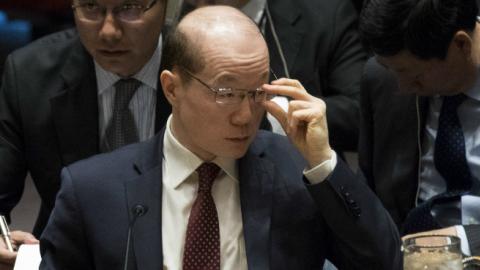Last week, China weakened a UN Security Council resolution against North Korea’s nuclear and missile programs by excluding an embargo on oil sales to Pyongyang. Nonetheless, Secretary of State Tillerson urged China, as a great power, to embargo such sales unilaterally. It seems unlikely that even the Secretary believes his request will be honored.
For decades, the U.S.’s unsuccessful North Korea policy has assumed China opposes North Korea’s nuclear obsession and only needs to be encouraged to accept its international responsibilities. What if we’re wrong?
Conventional wisdom holds that China does not want to see a nuclear-armed North Korea and is fed up with the Kim regime’s disrespect for China’s views. However, this version continues, China fears pressing Kim to the point of collapse. Such a collapse would supposedly flood China with Korean refugees and lead to re-unification of the peninsula under the Seoul government. That, in turn, might put U.S. troops along China’s border. Western interlocutors often hear this version directly from the Chinese, which seems to add to its credibility.
This conventional wisdom about China’s “quandary” suggests that China would readily join economic sanctions against North Korea, but only if they don’t entail an unacceptable (from the Chinese perspective) risk that North Korean implodes. Thus, U.S. policy prods or cajoles China to accept incremental steps to this end.
Even on its own terms, this appears to be a losing proposition. Kim has made clear that obtaining the capacity to launch a nuclear strike on the U.S. is his highest priority, and he’s getting close to success. Sanctions serious enough to shake Kim at this point would likely cause China to blink first.
In any case, China has clearly been unwilling to impose sanctions harsh enough to do the trick. In fact, China even announced recently that its trade with North Korea has increased.
Nor has the failure of sanctions generated any sense of crisis within the Chinese government. If this is a failure of Chinese policy, it is one with which Xi seems comfortable.
Three decades of failure should lead us at least to question the conventional wisdom. Perhaps the true Chinese attitude toward the North Korean nuclear program is more favorable than appears. It might do well to reflect on the phrase “barbarian handlers” – that is, Chinese official or unofficial representatives whose job it is to shape foreigners’ perceptions of China.
The conventional wisdom ignores the geo-strategic benefits that China derives from the North Korean nuclear program. The prospect of North Korean nuclear weapons has distracted U.S. attention in Asia since the Clinton Administration, and has rendered the U.S. a supplicant to China, soliciting its help.
This pays off for China in many ways. As we have seen, the Trump administration has withheld its fire on trade and financial issues as a result. The Bush and Obama Administrations welcomed Beijing convening leading nations in multi-party talks, thus enhancing China’s regional and diplomatic prestige. China may not unreasonably believe that all this gives it a freer hand to act aggressively in other arenas, such as China’s unlawful efforts to seize control of the South China Sea.
If the Chinese leadership really opposed the North Korean nuclear program, there are diplomatic alternatives it would pursue to lessen the risks that supposedly prevent it from pressing North Korea harder:
* If China fears North Koreans flowing across the Yalu River into China, it could seek international agreements to support quick repatriation of refugees and to finance displacement camps inside North Korea. (In reality, the Chinese regime is not so delicate that it wouldn't be willing to respond forcefully, not to say brutally, to any wave of Korean refugees trying to cross into China.)
* China could also seek guarantees about the nature of a reunified Korea. For one, it could push the South Koreans to agree in advance to bar U.S. forces from moving north of the DMZ and to reduce the U.S. presence on the peninsula.
* With the end of the North Korean missile threat, the rationale for the deployment of THAAD would disappear, and China could win assurances for its removal.
* More generally, China could reasonably expect a favored position in a unified Korea. China could count on its economic strength, and on popular anti-U.S. and anti-Japanese sentiment, to keep a unified Korea in a neutralist, if not pro-China, direction. Chinese-Korean economic ties could flourish in such an environment, tying Korea ever closer to China. This option would be particularly attractive during a left-wing South Korean presidency, as at present.
If China truly wanted to press North Korea to end its nuclear program, such measures would be on its agenda. But there is no indication China is thinking along these lines.
If, on the other hand, China actually regards the North Korean nuclear program as geopolitically advantageous, then its current policy makes good sense. By keeping the U.S. hoping that the next set of sanctions will do the trick, China buys time for the other gains it reaps.
All this would suggest the U.S. adopt a course less tolerant of China’s role. Indeed, the Trump Administration has hinted at stronger measures.
None of this proves, of course, that America’s decades-long conventional wisdom is wrong. But if policies based on it have repeatedly fallen short, isn’t it at least time for the general Washington community to rethink basic assumptions and the policies toward both North Korea and China that flow from them?


















